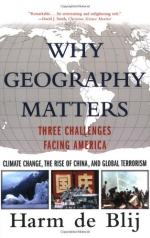
|
| Name: _________________________ | Period: ___________________ |
This test consists of 15 multiple choice questions and 5 short answer questions.
Multiple Choice Questions
1. How far did the Muslim world once reach?
(a) From Spain to western China.
(b) From Palestine to India.
(c) From Turkey to Kazakhstan.
(d) From Saudia Arabia to Iran.
2. Who became the leader of China after Mao died?
(a) Deng Xiaoping.
(b) Hua Guofeng.
(c) Lin Sen.
(d) Zhou Enlai.
3. What changes does de Blij suggest show that the European Union may eventually form one nation?
(a) Political statements that show leaders intend to merge all of Europe's countries into one.
(b) Newspapers and bullet trains that link countries and share patrons.
(c) Military alliances and shared weapons and intelligence.
(d) Sharing a currency and allowing travelers to cross borders without documentation.
4. What three groups fought over China in the early 20th century?
(a) Northerners, Southerners, and guerilla revolutionaries.
(b) Corporations, human rights agencies, and the United Nations.
(c) Nationalists, Communists, and the Japanese.
(d) Mongols, Koreans, and the Vietnamese.
5. What was the Cultural Revolution?
(a) A grassroots movement to make China more democratic.
(b) An attempt by the Chinese military to stage a coup.
(c) A purge of Chinese citizens who were viewed as bourgeois.
(d) A campaign to teach more cultural information in Chinese schools.
6. What was Russia like during the early years after the collapse of the Soviet Union?
(a) Unified.
(b) Orderly.
(c) Peaceful.
(d) Chaotic.
7. How do subsidizing American farmers hurt Africans?
(a) It takes away money that would otherwise be sent to Africa.
(b) It does not give African farmers an incentive to work more efficiently.
(c) It makes it impossible for African farmers to compete in the global market.
(d) It makes it harder for African farmers to get subsidies from other countries too.
8. What does de Blij think is the greatest risk to stability in Africa?
(a) The rise of Islamic extremism.
(b) Natural disasters such as droughts.
(c) Corruption in government.
(d) Lack of infrastructure.
9. What treaty, signed by Italy, France, West Germany, the Netherlands, Belgium, and Luxembourg in 1957, created the European Economic Community?
(a) The Treaty of Rome.
(b) The Treaty of Maastricht.
(c) The Treaty of Versailles.
(d) The Treaty of Brussels.
10. What was the USSR?
(a) An exclave of Russia located along its northern border.
(b) The group that fought for Afghan independence during the 1980s.
(c) The Asian version of the European Union.
(d) One of the world's two superpowers during the Cold War.
11. What does de Blij say is the difference between terrorist acts committed by the Corsicans, the Basques, the Tamils, and the Chechens, and terrorist acts committed by al Qaeda?
(a) Al Qaeda is based in just one country.
(b) Al Qaeda seems to have no clear objective for its violence.
(c) Al Qaeda uses different methods, such as bombs.
(d) Al Qaeda does not target civilians or noncombatants.
12. What is Afghanistan like today?
(a) It has become a satellite of Communist Russia.
(b) It lacks most modern amenities.
(c) It has a thriving agriculturally-based economy.
(d) It is a modern Islamic country.
13. What does de Blij say is the difference between an act of state-sponsored terrorism and an act of war?
(a) De Blij says that terrorist attacks target soldiers and politicians.
(b) De Blij says that it is not clear what the difference is.
(c) De Blij says that terrorist acts are motivated by religious faith.
(d) De Blij says that terrorist attacks are personal vendettas.
14. When did the Qing Dynasty collapse?
(a) In 820.
(b) In 2000.
(c) In 1610.
(d) In 1911.
15. How does the Chechen independence movement affect Groznyy?
(a) Much of Groznyy's population emigrates to Russia.
(b) Groznyy's unemployment rate skyrockets.
(c) Groznyy is devastated by fighting.
(d) Groznyy is bombed into a shell of a city.
Short Answer Questions
1. Why did both the United States and the Soviet Union support African tyrants?
2. How have Chinese nationalists reacted to American foreign policy decisions?
3. Why is Russia's population declining?
4. In which of the following countries are Muslims and Christians at war with each other?
5. What disease is currently at epidemic levels in sub-Saharan Africa?
|
This section contains 684 words (approx. 3 pages at 300 words per page) |

|




